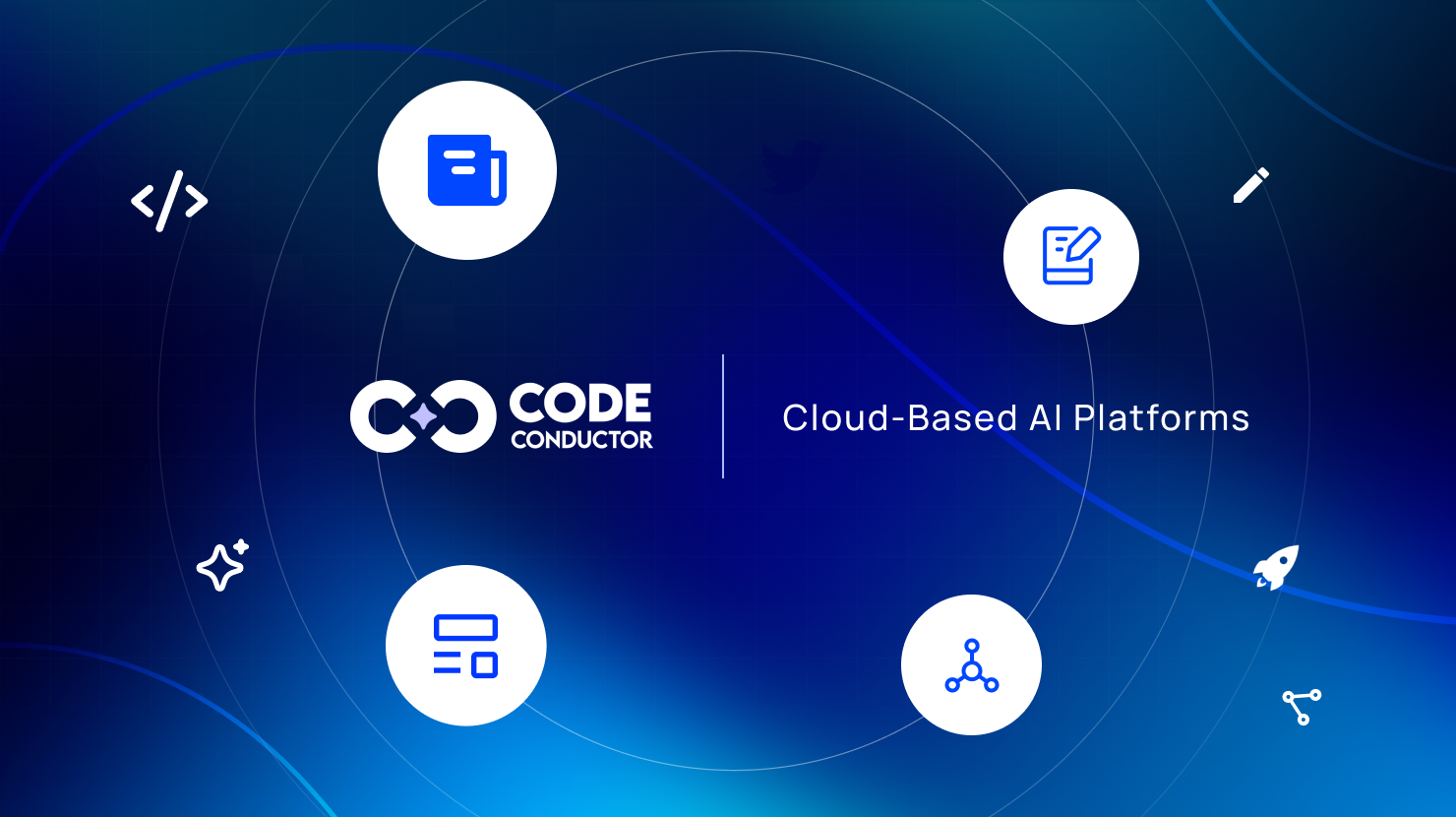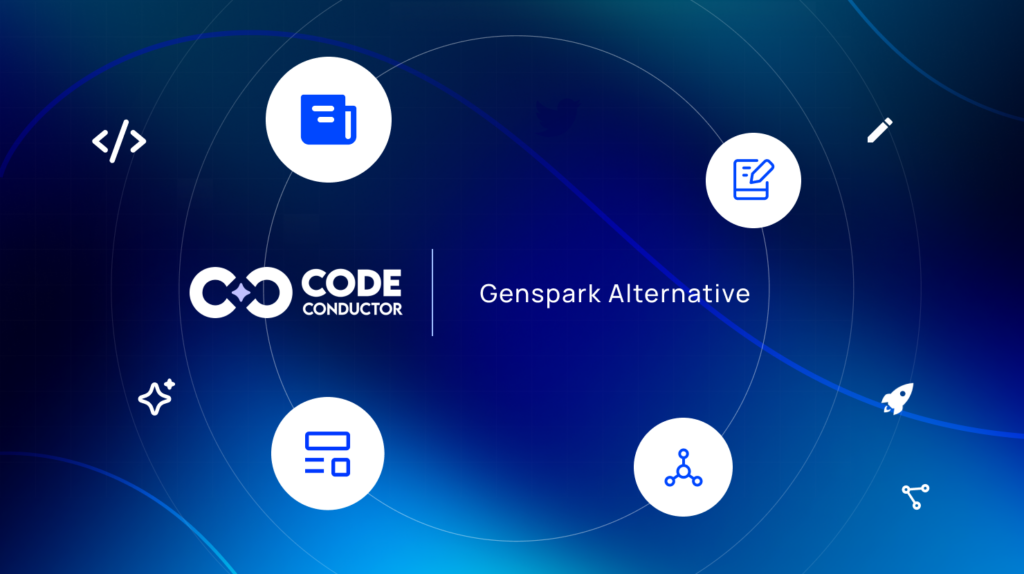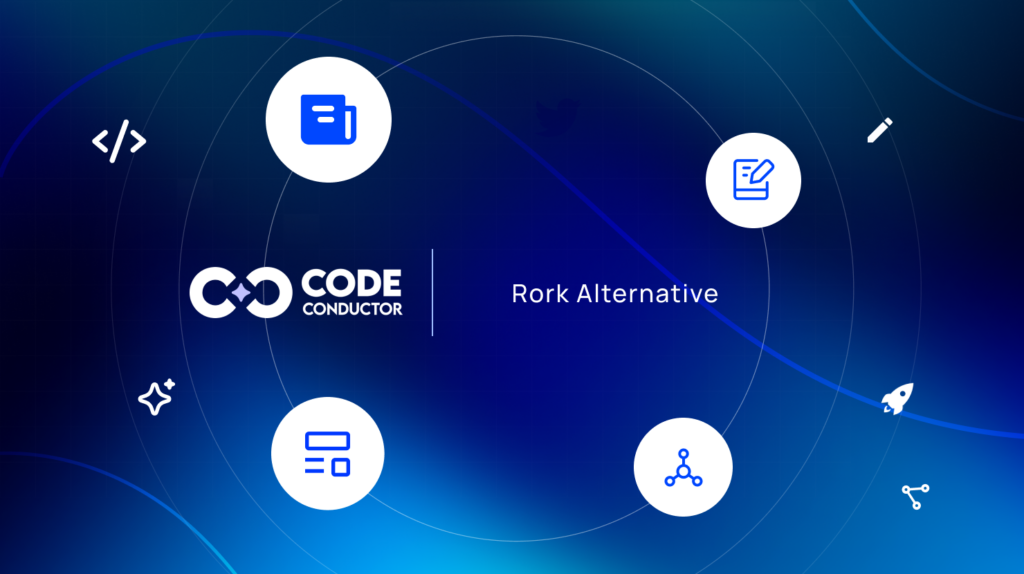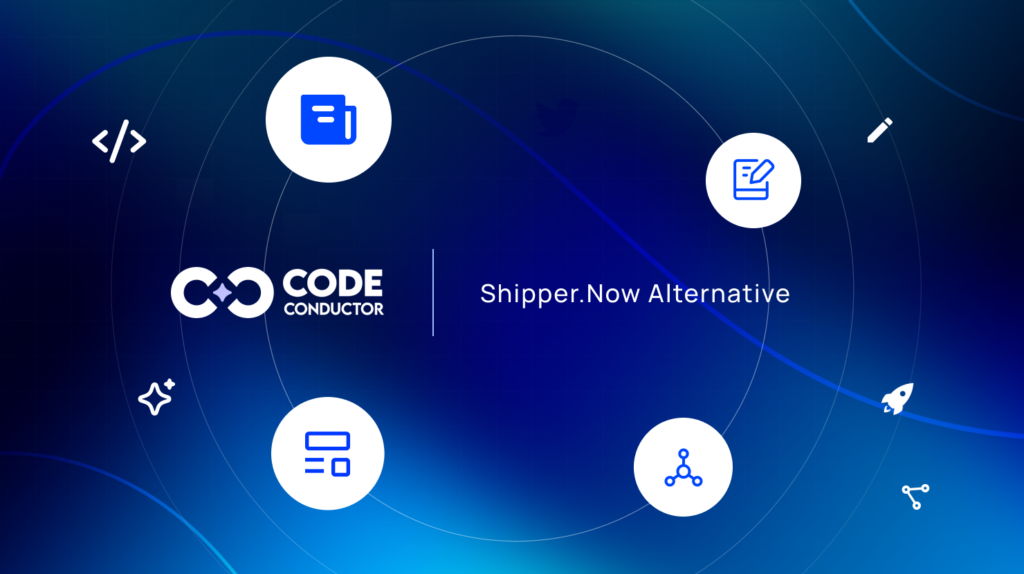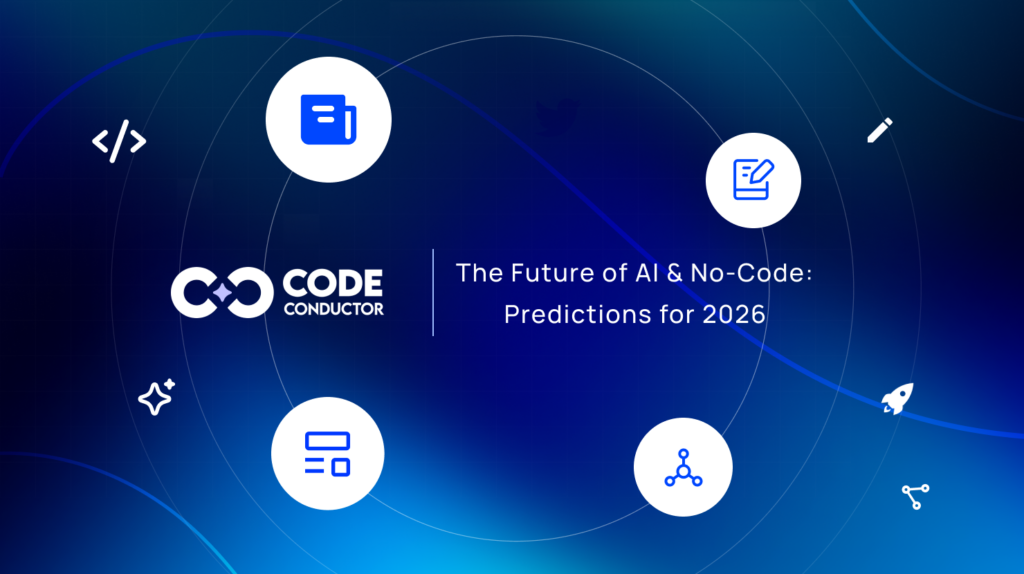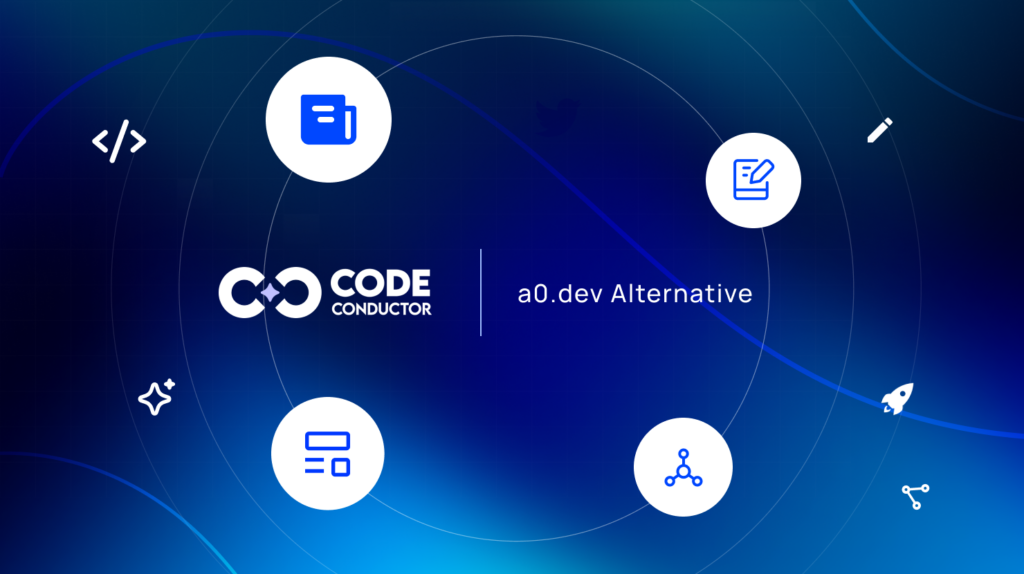According to a McKinsey report, AI will add a staggering $25.6 trillion to the global economy by 2027. [source]
Now, artificial intelligence (AI) isn’t just a futuristic concept but a practical tool at your fingertips. This is the reality of 2026, where top cloud-based AI platforms are transforming how developers create, innovate, and solve problems.
With the advent of cloud-based AI platforms, you have the power to access advanced AI tools, scale your projects effortlessly, and collaborate with teams across the globe — all from your laptop. It also eliminates the need for expensive hardware, offers a treasure trove of advanced tools, and enables developers to build smarter applications faster.
Just think of building and deploying sophisticated AI models without worrying about infrastructure – that’s what a cloud-based AI platform is!
In this article, we will break down the best cloud-based AI platforms for developers that they can use to create AI-powered software applications for businesses in 2026. We’ll highlight their amazing features, the unique benefits they offer, and real-world examples of how they’re making a difference.
So, stick around, because we’re pulling insights from the latest trends, ensuring you get the most reliable and up-to-date information. just keep scrolling to explore more about cloud-based AI development platforms.
In This Post
What are Cloud-Based AI Platforms?
Think of the power of a supercomputer without the heavy price tag or the space it takes up. That’s what cloud-based AI platforms offer.
These platforms allow developers to leverage advanced AI tools and resources over the internet, hosted on powerful remote servers. Instead of dealing with the complexities of setting up and maintaining hardware, you can focus on what you do best: creating and innovating.
These cloud-based AI platforms, also referred to as AI as a Service (AIaaS), provide artificial intelligence capabilities to individuals and organizations via remote servers.
These solutions democratize access to AI technologies, offering scalability and cost-efficiency for diverse applications. They are designed to be flexible, scalable, and accessible, making them ideal for developers at any level of expertise.
Why to consider the Cloud-based AI Platforms When Developing Applications?
Here are the following benefits of Cloud-based AI platforms for software developers
1. Scalability and Flexibility
Cloud-based AI platforms shine when it comes to scalability and flexibility. These platforms automatically adjust resources based on your project’s demands, ensuring you have the power you need when you need it.
This means you can handle larger datasets and more complex models without any performance issues. The flexibility to start small and grow big, or pivot quickly as needed, makes these platforms ideal for any development scenario.
Cloud scalability enables you to manage dynamic workloads efficiently, adapting to changing project requirements easily.
2. Cost Efficiency
One of the most attractive benefits of these cloud-driven AI technologies is their cost efficiency. These platforms operate on pay-as-you-go pricing models, which save you from significant upfront costs.
You no longer need to invest heavily in hardware maintenance and upgrades, as the cloud provider takes care of these expenses. This optimization means you only pay for the resources you use, allowing for more efficient budget management.
With cost-efficient AI solutions, you can access powerful AI tools without breaking the bank.
3. Access to Advanced Tools and Frameworks
These AI Cloud Infrastructures provide developers with access to the latest AI technology effortlessly.
You can utilize cutting-edge machine learning frameworks and libraries, which are often updated regularly to include the newest advancements. Pre-trained models and ready-to-use APIs simplify the development process, allowing you to integrate advanced features quickly.
This access ensures you are always working with state-of-the-art tools, keeping your projects on the cutting edge of technology.
4. Collaboration and Integration
Enhancing teamwork and streamlining workflows are key advantages of cloud-based AI platforms. These platforms enable real-time collaboration with team members from anywhere in the world.
These AI Cloud services integrate seamlessly with other cloud services and tools, creating a cohesive development environment. Improved project management and communication are natural outcomes of such integration, allowing for efficient and synchronized teamwork.
Collaborative AI platforms facilitate better interaction and project synchronization among development teams.
5. Security and Reliability
Trusting in the security and reliability of AI-Powered Cloud platforms is paramount. These platforms benefit from high-level security protocols and data protection measures, ensuring your projects and data are safe.
With minimal downtime and continuous updates, you can rely on these services to be available when you need them. Providers maintain and update the infrastructure, so you don’t have to worry about security breaches or service interruptions.
Secure and reliable AI solutions offer peace of mind, knowing your data is protected and your tools are dependable.
List of Best Cloud-Based AI Platforms [2026 Trending]
Explore the leading Cloud-based Software Development Platforms of 2026 that are transforming the way developers build intelligent applications.
This article provides an in-depth look at top platforms. So, let’s discover their unique features, benefits, and real-world applications to help you choose the best AI Software Development solution for your projects.
#1. CodeConductor
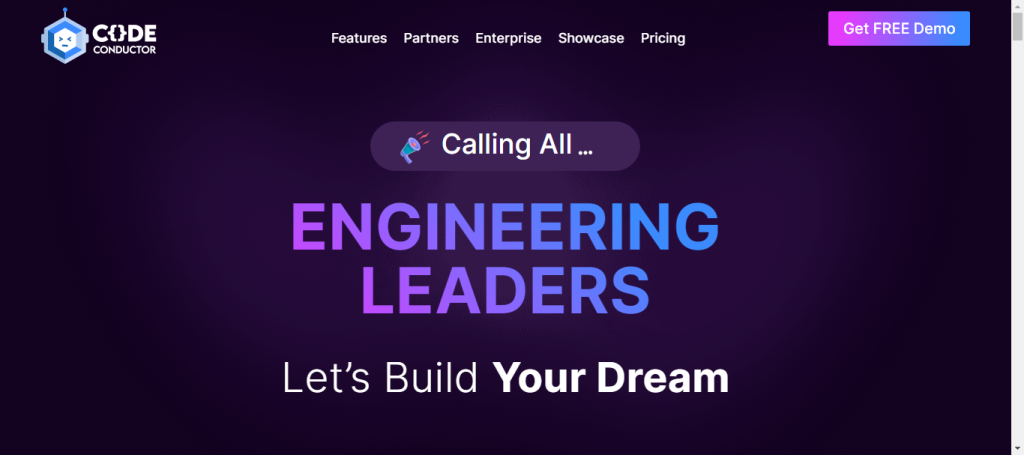
CodeConductor is an AI-powered software development platform, known for its seamless integration of AI. This platform enables users to automate decision-making processes and streamline product or app development.
With an intuitive interface and powerful AI-driven tools, CodeConductor empowers developers, app founders, product managers, and other industry experts to build sophisticated applications effortlessly.
Top Features:
- AI-powered design recommendations: Suggest optimal design elements based on user preferences and industry standards.
- Automated coding assistance: Helps generate and optimize code, reducing development time.
- Real-time collaboration tools: Enable teams to work together efficiently, regardless of location.
- Robust security protocols: Ensures data protection and privacy.
- Intuitive interface: User-friendly design makes it accessible for non-technical users.
Unique Benefits:
- Simplifies the development process for developers and beginners (those who have less technical knowledge).
- Reduces time and effort required to build products.
- Enhances productivity through automation and collaboration.
- Reduces Cost of software development by 80%
Real-World Examples:
- Businesses, product managers, and app founders create enterprise-grade products and applications with minimum coding knowledge.
- Development teams collaborate remotely to build complex applications efficiently.
Website: https://codeconductor.ai/
#2. Amazon Web Services (AWS) AI
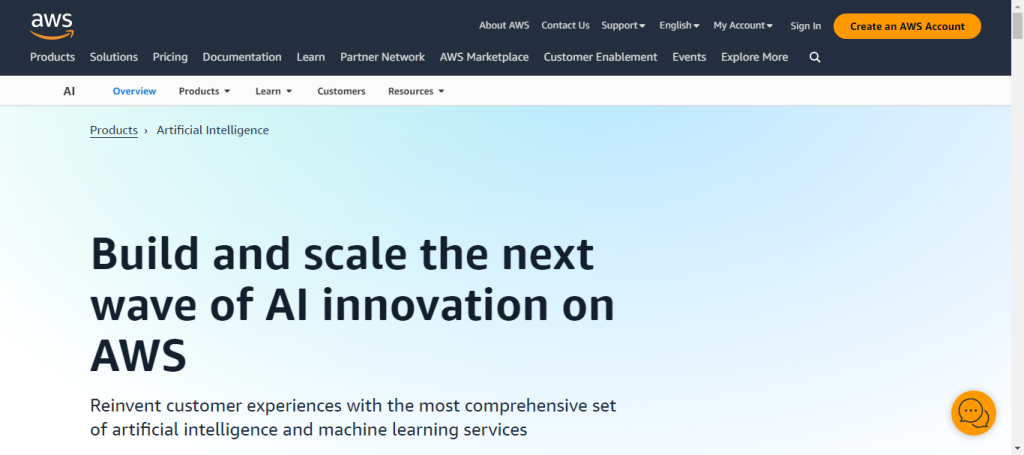
Amazon Web Services (AWS) AI is a leader in providing comprehensive AI services and tools. AWS AI empowers developers to build intelligent applications through services like Amazon SageMaker for machine learning and Amazon Rekognition for image and video analysis.
AWS’s extensive infrastructure and scalability make it suitable for both large enterprises and innovative startups.
Top Features:
- Amazon SageMaker: End-to-end machine learning service for building, training, and deploying models.
- Amazon Rekognition: Powerful image and video analysis tool.
- AWS Lambda: Serverless compute service that runs code in response to events.
- Amazon Lex: Service for building conversational interfaces.
- Scalable infrastructure: Supports projects of any size with reliable performance.
Unique Benefits:
- Extensive documentation and community support.
- High scalability and reliability for enterprise-level applications.
- Wide range of integrated services to cover all aspects of AI development.
Real-World Examples:
- Healthcare providers using Amazon Rekognition for patient identification.
- E-commerce companies leveraging Amazon Lex for customer service chatbots.
Website: https://aws.amazon.com/ai/
#3. Google Cloud AI
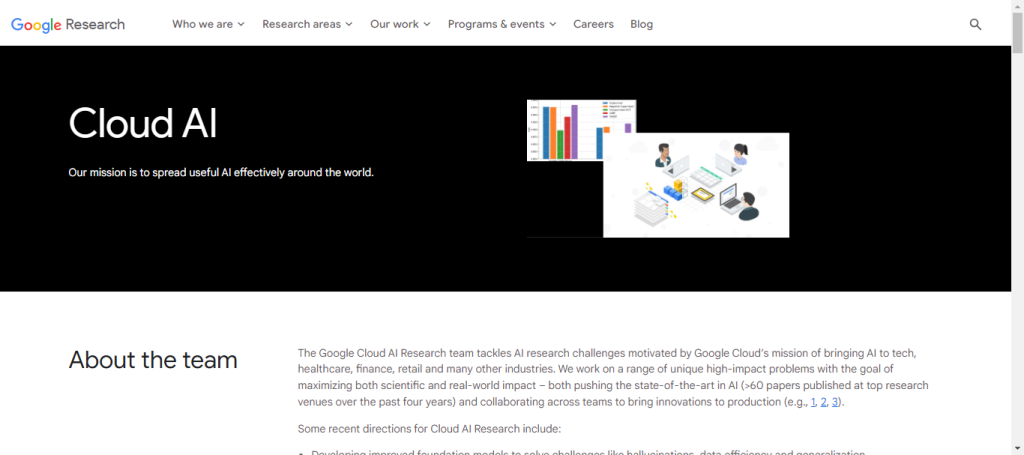
Google Cloud AI delivers powerful AI tools leveraging Google’s expertise in machine learning and data analytics.
Google Cloud AI services, such as AutoML and TensorFlow, help developers build and deploy high-quality custom machine learning models effortlessly. The platform is known for its innovation and seamless integration with other Google services.
Top Features:
- AutoML: Allows developers to train high-quality custom machine learning models with minimal effort.
- TensorFlow: Open-source machine learning framework.
- Vision AI: Image analysis capabilities.
- Natural Language API: Language analysis and processing.
- BigQuery ML: Integrates machine learning with BigQuery for data analysis.
Unique Benefits:
- Cutting-edge research and innovative tools.
- Seamless integration with other Google Cloud services.
- Extensive support for various AI and data analytics needs.
Real-World Examples:
- Retailers using Vision AI for inventory management.
- Media companies leveraging Natural Language API for content categorization and sentiment analysis.
Website: https://research.google/teams/cloud-ai/
#4. Microsoft Azure AI
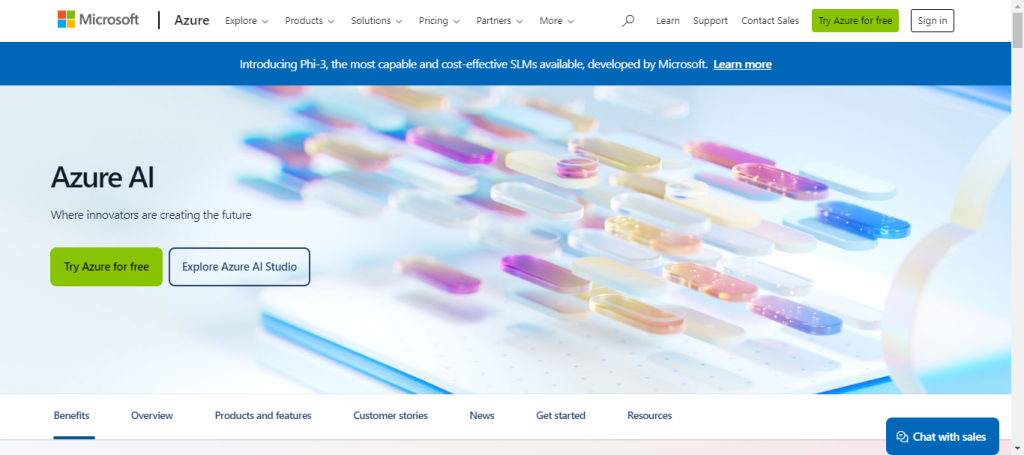
Microsoft Azure AI offers a wide range of AI services that cater to various development needs.
Azure AI includes Azure Machine Learning, which provides tools for building, training, and deploying machine learning models, and Azure Cognitive Services, which offers APIs for vision, speech, language, and decision-making capabilities.
Azure AI stands out for its enterprise-grade security, hybrid capabilities, and seamless integration with Microsoft’s other products and services.
Top Features:
- Azure Machine Learning: Tools for building, training, and deploying machine learning models.
- Cognitive Services: APIs for vision, speech, language, and decision-making capabilities.
- Bot Service: Framework for building intelligent bots.
- Azure Synapse Analytics: Integrated analytics service.
- Security and compliance: Enterprise-grade security protocols.
Unique Benefits:
- Enterprise-grade security and compliance.
- Hybrid capabilities for on-premises and cloud integration.
- Extensive support for different programming languages and frameworks.
Real-World Examples:
- Financial institutions using Azure Cognitive Services for fraud detection.
- Manufacturing companies employing Azure Machine Learning for predictive maintenance.
Website: https://azure.microsoft.com/en-in/solutions/ai
#5. Salesforce Einstein
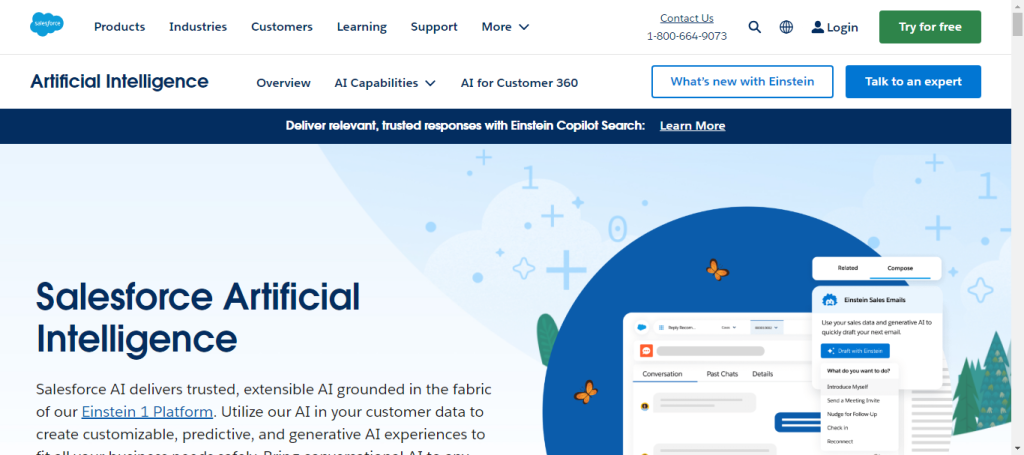
Salesforce has integrated AI into its CRM platform through Salesforce Einstein, offering AI-powered analytics, predictions, and automation.
Salesforce Einstein provides tools that help businesses improve customer interactions, automate workflows, and gain insights from data.
Features:
- Predictive analytics: Provides insights and forecasts based on data.
- Natural language processing: Enhances customer interactions through better understanding.
- Image recognition: Automates visual data processing.
- Smart recommendations: Suggests next steps for sales and customer service.
- Workflow automation: Streamlines business processes.
Unique Benefits:
- Enhances customer relationship management with AI-driven insights.
- Automates routine tasks, improving efficiency.
- Provides actionable insights to improve decision-making.
Real-World Examples:
- Businesses use predictive analytics to forecast sales trends.
- Customer service teams leveraging smart recommendations to enhance support.
Website: https://www.salesforce.com/artificial-intelligence/
#6. IBM Watson
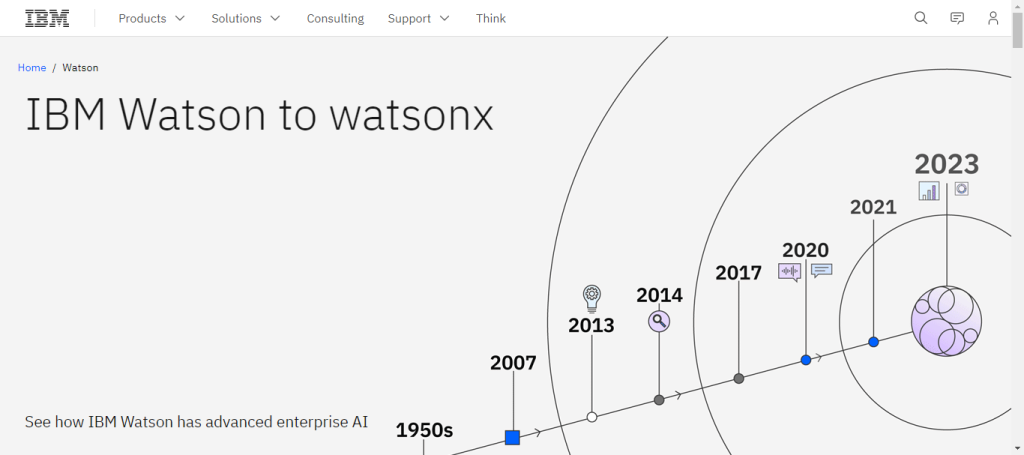
IBM Watson provides a robust AI platform with services that include machine learning, natural language processing, and computer vision.
Watson offers tools for building AI applications that can understand, reason, and learn, with a strong focus on enterprise solutions and AI ethics.
Features:
- Watson Studio: Environment for building and training models.
- Watson Assistant: Tool for creating chatbots and virtual assistants.
- Watson Discovery: Extracts insights from unstructured data.
- Natural Language Understanding: Analyzes text to extract meta-data.
- Visual Recognition: Identifies and classifies images.
Unique Benefits:
- Strong focus on enterprise solutions and AI ethics.
- Comprehensive tools for various AI applications.
- High level of security and data protection.
Real-World Examples:
- Healthcare organizations use Watson Discovery to analyze patient records.
- Retail companies deploying Watson Assistant for customer service.
Website: https://www.ibm.com/watson
#7. DataRobot
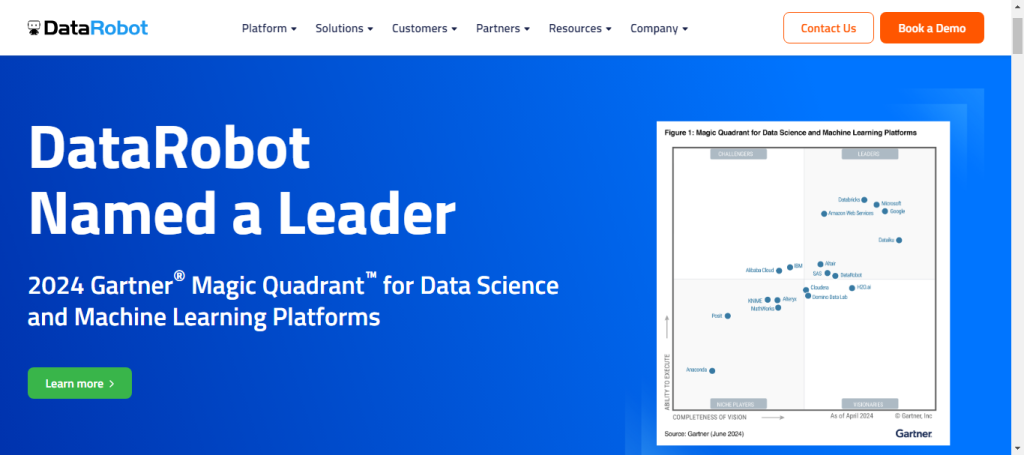
DataRobot is an AI platform focused on automating the end-to-end process of building, deploying, and managing machine learning models.
It provides an intuitive interface and automated machine-learning capabilities that allow users to create accurate predictive models without needing deep data science expertise.
Features:
- Automated feature engineering: Streamlines the preparation of data for modeling.
- Model selection and optimization: Automatically chooses and tunes the best models.
- Deployment tools: Simplifies the deployment of models into production.
- Model monitoring: Tracks performance and accuracy over time.
- User-friendly interface: Accessible for users with varying levels of expertise.
Unique Benefits:
- Speeds up the AI development process with automation.
- Reduces the need for extensive data science expertise.
- Ensures models remain accurate and effective over time.
Real-World Examples:
- Financial services using DataRobot for credit scoring and risk assessment.
- Retailers employ automated feature engineering for sales forecasting.
Website: https://www.datarobot.com/
#8. Oracle
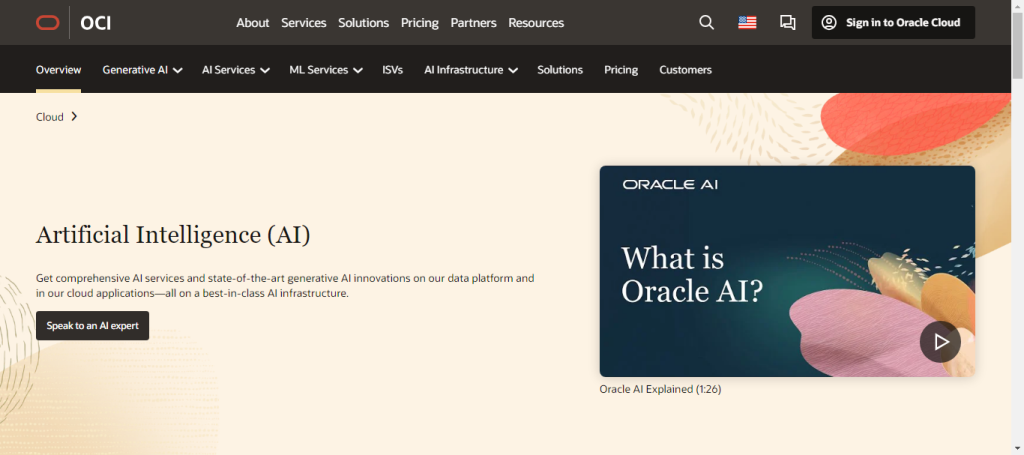
Oracle offers AI services as part of its Oracle Cloud Infrastructure, providing tools for machine learning, data science, and AI-driven analytics.
Oracle’s AI platform includes Oracle Autonomous Database, which integrates machine learning for self-tuning and self-patching capabilities, and Oracle AI services that offer pre-trained models for various applications.
Features:
- Oracle Autonomous Database: Integrates machine learning for self-tuning and self-patching capabilities.
- Oracle AI Services: Pre-trained models for various applications.
- Advanced analytics: Provides deep insights from data.
- Automated data processing: Streamlines data management tasks.
- Integration with Oracle Cloud: Seamlessly integrates with other Oracle services.
Unique Benefits:
- Combines AI with robust cloud infrastructure for comprehensive solutions.
- Enhances data management and analysis capabilities.
- Supports large-scale enterprise applications.
Real-World Examples:
- Enterprises using Oracle AI for financial analytics and reporting.
- Manufacturing companies leveraging automated data processing for supply chain management.
Website: https://www.oracle.com/artificial-intelligence/
#9. H2O.ai
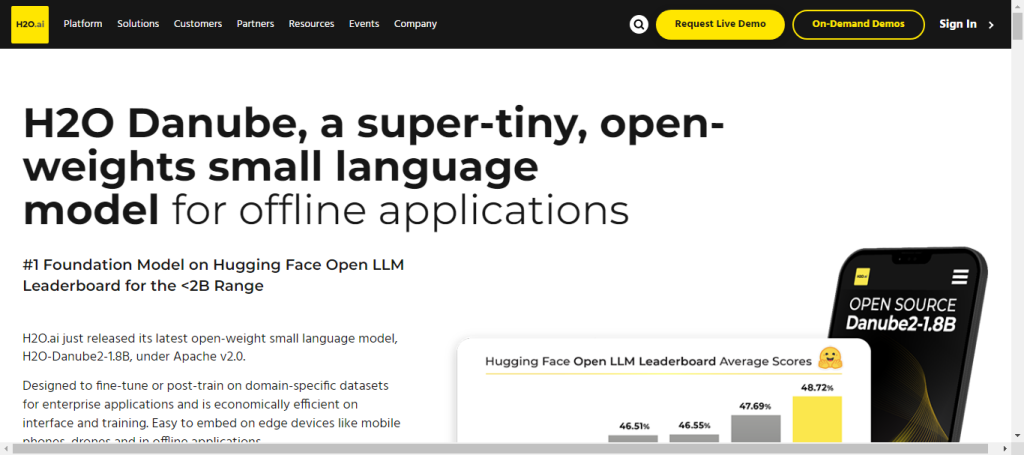
H2O.ai provides an open-source AI platform that emphasizes automated machine learning (AutoML) and model interpretability.
This platform is designed to make AI accessible to everyone, from data scientists to business analysts, enabling them to build predictive models quickly and accurately.
Features:
- H2O Driverless AI: Automated machine learning platform for creating predictive models.
- Model interpretability: Tools to explain and visualize model decisions.
- Scalable machine learning: Supports distributed computing environments.
- Time series forecasting: Advanced tools for time-based predictions.
- AI app store: Pre-built AI applications for various use cases.
Unique Benefits:
- Automation of the machine learning process reduces development time.
- Strong focus on model transparency and interpretability.
- Scalability for handling large datasets and complex models.
Real-World Examples:
- Financial institutions using H2O.ai for fraud detection and credit scoring.
- Healthcare organizations leveraging predictive models for patient care optimization.
Website: https://H2O.ai
#10. Alibaba Cloud
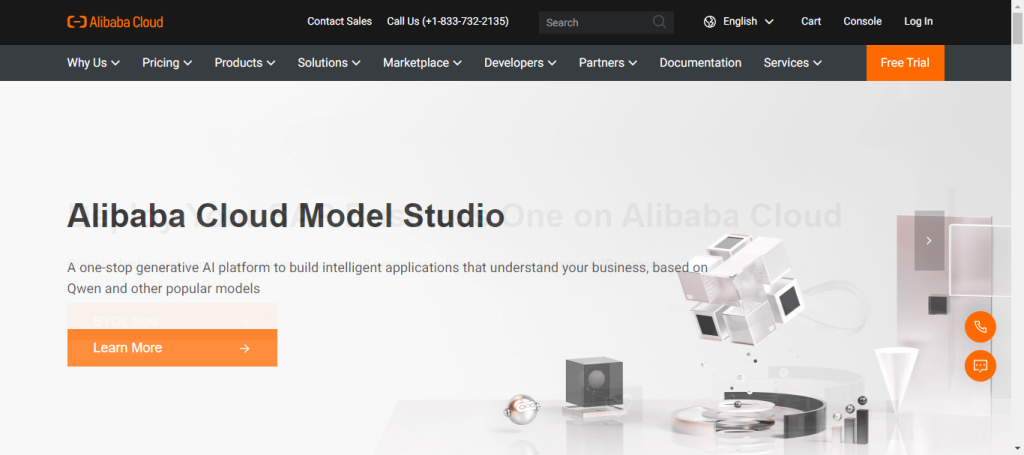
Alibaba Cloud offers a range of AI services through its AI platform, including machine learning, natural language processing, and computer vision.
Alibaba Cloud’s AI solutions are designed to support large-scale data processing and real-time analytics, making them suitable for businesses operating in fast-paced environments.
Features:
- Machine Learning Platform for AI (PAI): Tools for data preparation, model training, and deployment.
- Real-time analytics: Provides actionable insights from data.
- Scalable infrastructure: Supports large-scale data processing and AI applications.
- Advanced analytics services: Delivers deep data insights.
- AI-driven solutions: Pre-trained models and customizable tools for various industries.
Unique Benefits:
- Robust infrastructure designed for scalability.
- Comprehensive tools for real-time data processing and analytics.
- Strong focus on integrating AI with other cloud services.
Real-World Examples:
- E-commerce platforms using Alibaba Cloud AI for personalized recommendations.
- Logistics companies leveraging real-time analytics for supply chain optimization.
Website: https://www.alibabacloud.com/
How to Choose The Best Cloud AI Platform for Software Development?
Selecting the right cloud AI software development platform can be a daunting task given the plethora of options available. However, by focusing on key criteria, you can identify the platform that best meets your needs. Here’s a guide to help you make an informed decision:
1. Features and Capabilities
Evaluate the specific features and capabilities each platform offers.
- Look for platforms that offer a comprehensive set of tools, including machine learning, natural language processing, and computer vision.
- Consider the availability of pre-trained models and the ease of building custom models.
- Assess the quality and usability of APIs provided by the platform.
2. Pricing and Cost Structure
Understand the pricing models and overall cost structure.
- Compare the pricing models of different platforms, including pay-as-you-go, subscription, and tiered pricing.
- Evaluate the cost efficiency by considering potential hidden costs, such as data transfer fees and additional service charges.
- Assess whether the platform offers free trials or credits to help you test its services before committing financially.
3. Ease of Use and Integration
Assess how user-friendly the platform is and how well it integrates with your existing systems.
- Look for platforms with intuitive interfaces and comprehensive documentation.
- Consider the ease of integrating the platform with your current workflow, tools, and data sources.
- Evaluate the availability of tutorials, community support, and customer service.
4. Scalability and Performance
Determine the platform’s ability to scale and perform under varying workloads.
- Assess the platform’s capacity to handle large datasets and high-volume requests.
- Evaluate the performance benchmarks and uptime guarantees.
- Consider the platform’s ability to scale resources dynamically based on your needs.
5. Security and Compliance
Ensure the platform meets your security and compliance requirements.
- Evaluate the security measures in place, such as data encryption, access controls, and threat detection.
- Consider compliance with industry standards and regulations like GDPR, HIPAA, and others relevant to your field.
- Assess the platform’s track record for security incidents and its response strategies.
6. Support and Community
The importance of robust support and an active community.
- Evaluate the quality and availability of customer support, including response times and expertise.
- Consider the size and activity level of the user community and the availability of forums and discussion groups.
- Look for platforms that offer extensive resources, such as FAQs, knowledge bases, and training materials.
Which Cloud-Driven AI Platform is Best for Software Development?
When comparing various AI platforms, it’s helpful to create a checklist of these key factors and score each platform based on your findings.
Here’s a brief comparison table of some popular cloud-based AI platforms:
| Criteria | CodeConductor | Amazon Web Services (AWS) AI | Google Cloud AI | Microsoft Azure AI | IBM Watson |
|---|---|---|---|---|---|
| Features | AI-powered design recommendations, automated coding assistance, real-time collaboration tools | Comprehensive tools, extensive APIs, and pre-trained models | AutoML, TensorFlow, strong NLP capabilities | Azure Machine Learning, Cognitive Services, integration with Microsoft products | Watson Studio, Assistant, Discovery, strong enterprise focus |
| Pricing | Competitive pricing with a focus on accessibility | Pay-as-you-go, cost-effective for large-scale projects | Competitive pricing with various tiers | Flexible pricing models, suitable for various budgets | Tiered pricing, with enterprise solutions |
| Ease of Use | Ideal for developers and industry experts | Intuitive but requires some technical knowledge | User-friendly with great documentation | Easy integration with other Microsoft tools | User-friendly interface with strong documentation |
| Scalability | Scalable solutions that can grow with your projects | Highly scalable, suitable for enterprises | Excellent scalability and performance | Scalable solutions for large and small projects | Highly scalable for enterprise needs |
| Security | High-level security and data protection measures | Strong security protocols and compliance | High-level security and compliance | Enterprise-grade security and compliance | Focus on security and compliance |
| Support | 24/7 support with extensive resources and a growing user community | Excellent support and community resources | Robust support and active community | Comprehensive support and a large user community | Strong support with extensive resources |
Based on the above comparison, we feel we have made CodeConductor the best in the business. It is the world’s 1st AI Software Development platform that is well equipped with the latest artificial intelligence and machine learning features. It aims to ease the software development process and reduce its cost by 80%.
So, don’t miss out on the opportunity to simplify your product development process and achieve more in less time. Try CodeConductor today and experience the future of website and app development.
Book your demo today now and see how CodeConductor can enhance your projects!
Try CodeConductor – Best Cloud-Based AI Platform

Founder CodeConductor

